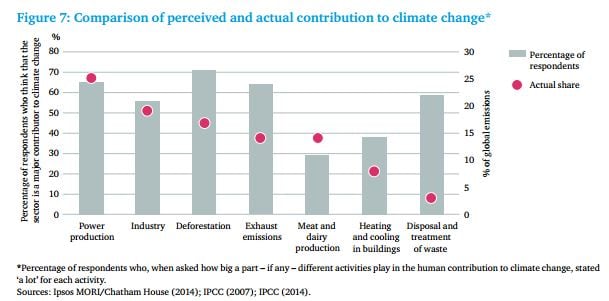Consumers are unaware of the contribution their diets can make to climate change, it says in a report – and a goal to limit the rise in global temperature to less than two degrees is unachievable unless there is a strong shift in dietary patterns.
Its analysis puts emissions from livestock at 14.5% of the global total – on the low side of common estimates. The most widely cited figure is the 18% indicated by the Food and Agriculture Organization (FAO) in a 2006 report called “Livestock’s Long Shadow”. But other estimates have been as high as 51%.
Chatham House commissioned a 12-country survey to examine consumer perceptions of climate change. It found that across all emissions sectors, “recognition of the livestock sector as a contributor to climate change was markedly the lowest”.
The report’s authors wrote that this lack of awareness tended to translate to indifference. Among those who were unaware of livestock’s impact, 54% said they were unwilling to change their meat consumption and 62% were unwilling to change their dairy consumption.

Dietary trends must be addressed
“Meat and dairy consumption is set to grow rapidly in the next 40 years and it is unlikely dangerous climate change can be avoided unless consumption falls,” said the report’s lead author and research director, Energy, Environment and Resources, Rob Bailey.
The survey suggested that those who were most aware of a sector’s impact on climate change were most likely to change their behaviour.
Bailey added: “Addressing dietary trends has to be part of an international strategy to reduce emissions. Ultimately, as with energy use, consumers need to change their behaviour and this survey shows a substantial lack of awareness of this.”
According to the Intergovernmental Panel on Climate Change, the greatest potential for livestock-related emissions reduction relies on people choosing to eat less meat and dairy. This point is well illustrated by an interactive web tool recently launched by the UK Department for Energy and Climate Change to explore how different lifestyle, energy, transport and manufacturing choices could affect emissions and potential temperature changes by the end of the century.
Even significant carbon reduction changes on the supply side of agriculture and livestock production would be insufficient to limit the rise in global temperatures to two degrees Celsius, the Chatham House analysis found.
The report’s co-author and research associate, Energy, Environment and Resources, Laura Wellesley said: “Put simply, the Western diet is a four-degree diet. The rest of the world cannot afford to converge around such levels of excess.”
